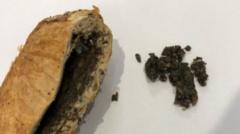The deliberation of the jury commenced in the trial of Erin Patterson, 50, who faces charges including three counts of murder linked to a deadly lunch she prepared for relatives in Victoria in July 2023. The court heard claims from the prosecution that Patterson intentionally included toxic mushrooms in a beef Wellington dish, leading to the deaths of her in-laws and their sister. In contrast, the defense insists the inclusion of the poisonous fungi was accidental, with Patterson claiming she panicked after the tragic incident. Following a comprehensive two-month trial, the jury will decide Patterson's fate while being instructed by Justice Christopher Beale to separate their emotions from the process and focus solely on the evidence presented.
**Jury Begins Deliberations in High-Profile Australian Murder Case**

**Jury Begins Deliberations in High-Profile Australian Murder Case**
The jury in a controversial murder trial returns to assess the case of a woman accused of serving lethal mushrooms to her loved ones.
The article text follows:
The jury in the high-profile murder trial of Erin Patterson, a woman accused of poisoning relatives with a deadly mushroom lunch, has begun deliberations on her guilt or innocence. Patterson, aged 50, has pleaded not guilty to four charges, comprised of three counts of murder and one of attempted murder, relating to a beef Wellington meal served at her home in Leongatha, Victoria, in July 2023.
Prosecutors alleged that Patterson knowingly cooked with toxic death cap mushrooms and later attempted to hide her actions by lying to police and disposing of crucial evidence. In contrast, the defense claimed that Patterson’s inclusion of the toxic fungi was unintentional. They argue that her lies stemmed from panic following the incident rather than guilt.
The tragic aftermath of the lunch saw Patterson's in-laws, Don and Gail Patterson, both 70, and Gail's sister, Heather Wilkinson, 66, fall gravely ill, all of whom succumbed to the poison shortly afterward. Heather's spouse, Pastor Ian Wilkinson, survived after a protracted recovery period in a medically induced coma. Notably, Patterson’s estranged husband opted out of attending the meal just a day prior.
During the trial, Justice Christopher Beale provided the jury with comprehensive instructions, encapsulating the testimonies from more than 50 witnesses and both the prosecution and defense arguments. In her closing statements, prosecutor Nanette Rogers SC characterized Patterson as deceitful, asserting that she fabricated multiple stories, including a false cancer diagnosis, to manipulate her family into attending the fatal meal.
The prosecution maintained that Patterson constructed a web of lies, suggesting that her behavior evidenced her awareness of guilt. Conversely, the defense emphasized the absence of a clear motive for the alleged crime, claiming that Patterson had no intention to harm those she loved. Her defense attorney, Colin Mandy SC, criticized the prosecution's approach, asserting that they were misrepresenting evidence to fit a narrative.
Justice Beale reminded jurors that their task is solely to judge the facts before them. He cautioned against allowing sympathy for the victims to influence their judgment and reiterated that even behaviors that may seem guilty do not inherently signify actual guilt.
As deliberations proceed, the jury has been sequestered, meaning they are isolated from external influences and must stay in designated accommodations until a verdict is reached. The community watches closely as the jury's decision holds significant implications for all involved.
The jury in the high-profile murder trial of Erin Patterson, a woman accused of poisoning relatives with a deadly mushroom lunch, has begun deliberations on her guilt or innocence. Patterson, aged 50, has pleaded not guilty to four charges, comprised of three counts of murder and one of attempted murder, relating to a beef Wellington meal served at her home in Leongatha, Victoria, in July 2023.
Prosecutors alleged that Patterson knowingly cooked with toxic death cap mushrooms and later attempted to hide her actions by lying to police and disposing of crucial evidence. In contrast, the defense claimed that Patterson’s inclusion of the toxic fungi was unintentional. They argue that her lies stemmed from panic following the incident rather than guilt.
The tragic aftermath of the lunch saw Patterson's in-laws, Don and Gail Patterson, both 70, and Gail's sister, Heather Wilkinson, 66, fall gravely ill, all of whom succumbed to the poison shortly afterward. Heather's spouse, Pastor Ian Wilkinson, survived after a protracted recovery period in a medically induced coma. Notably, Patterson’s estranged husband opted out of attending the meal just a day prior.
During the trial, Justice Christopher Beale provided the jury with comprehensive instructions, encapsulating the testimonies from more than 50 witnesses and both the prosecution and defense arguments. In her closing statements, prosecutor Nanette Rogers SC characterized Patterson as deceitful, asserting that she fabricated multiple stories, including a false cancer diagnosis, to manipulate her family into attending the fatal meal.
The prosecution maintained that Patterson constructed a web of lies, suggesting that her behavior evidenced her awareness of guilt. Conversely, the defense emphasized the absence of a clear motive for the alleged crime, claiming that Patterson had no intention to harm those she loved. Her defense attorney, Colin Mandy SC, criticized the prosecution's approach, asserting that they were misrepresenting evidence to fit a narrative.
Justice Beale reminded jurors that their task is solely to judge the facts before them. He cautioned against allowing sympathy for the victims to influence their judgment and reiterated that even behaviors that may seem guilty do not inherently signify actual guilt.
As deliberations proceed, the jury has been sequestered, meaning they are isolated from external influences and must stay in designated accommodations until a verdict is reached. The community watches closely as the jury's decision holds significant implications for all involved.


















